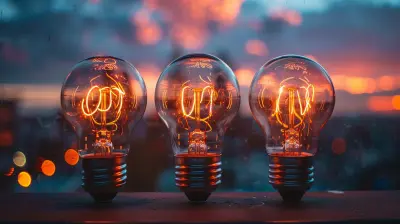Study Smarter, Not Harder: Techniques for Maximizing Efficiency
26 November 2025
Let’s be real—studying for hours on end, guzzling coffee, and pulling all-nighters isn’t exactly the secret recipe for academic success. Sure, it might work in the short term, but is it really sustainable? Definitely not.
Here’s the good news: You actually don’t need to study harder... You just need to study smarter.
In this guide, we’re diving headfirst into practical, science-backed, and easy-to-apply techniques to help you maximize your study efficiency. Whether you're in high school, college, or picking up a new skill, these tips are your golden ticket to studying like a pro.
Why “Study Smarter, Not Harder” Matters More Than Ever
Let’s face it—life’s busier than it’s ever been. With classes, assignments, part-time jobs, and (hopefully) a social life, your schedule is packed. You don’t have time to waste on ineffective study habits.Studying smarter means making every minute of your study session count. It’s about quality over quantity. You want to walk away from your desk actually remembering what you studied, not wondering where all your time went.
1. Set Clear, Achievable Goals
Break It Down Like a Boss
Ever felt overwhelmed by a massive project or upcoming exam? Yeah, we’ve all been there.Instead of saying, “I need to study biology today,” break it down into bite-sized goals. Something like “Review cell structure” or “Quiz myself on mitosis vs. meiosis.”
Why? Micro-goals are less intimidating and way easier to tackle. Plus, checking them off gives you that sweet sense of achievement.
Use the SMART Method
Stick to goals that are:- Specific
- Measurable
- Achievable
- Relevant
- Time-bound
So, instead of “Get better at math,” try “Practice 10 algebra problems in 30 minutes.”
2. Embrace Active Learning (Seriously, Just Reading Isn’t Enough)
Reading your notes over and over again might feel productive, but let’s be honest—it’s the academic version of spinning your wheels.Try These Active Learning Techniques:
- Teach Someone Else: If you can explain it simply, you truly understand it.- Use Flashcards: Recalling info helps lock it into your long-term memory.
- Quiz Yourself Regularly: Simulate test conditions—no peeking!
- Mind Mapping: Visual learners, this one's for you. Create diagrams to connect concepts.
Engaging your brain actively is like giving it a workout—it gets stronger, faster.
3. Leverage the Power of Spaced Repetition
Did you know cramming is the enemy of retention?What’s Spaced Repetition?
It’s a technique where you review information at increasing intervals. Think of it like watering a plant—you don't dump a gallon at once, you water it regularly over time.Apps like Anki or Quizlet are great for setting up spaced repetition schedules. Use them!
4. The Pomodoro Technique: Study in Sprints
Ever hear of the Pomodoro Technique? It’s productivity magic.Here’s the gist:
- Study for 25 minutes (that’s one “Pomodoro”).
- Take a 5-minute break.
- After 4 Pomodoros, take a longer break (15–30 minutes).
This method leverages your brain’s natural focus cycles. It keeps fatigue at bay and helps you avoid burnout.
You’re not a machine—you’re a human being. Give your brain the breaks it deserves.
5. Cut Out the Noise (Literally and Figuratively)
Let’s talk distractions. Your phone, social media, Netflix just one click away… They’re all study killers.Create a Distraction-Free Environment:
- Put Your Phone on Airplane Mode (or use apps like Forest or Focusmate).- Use Noise-Cancelling Headphones if you're in a noisy place.
- Keep Only What You Need on your desk—ditch the clutter.
If you wouldn’t bring a TV to the gym, don’t bring distractions into your study space. Focus is your study superpower.
6. Find Your Best Time to Study
Are you a morning bird or a night owl?Don't force yourself to study at times when your brain’s basically in sleep mode. Everyone has different peak energy hours—own yours.
Track when you feel most alert and build your study schedule around that. Studying at your optimal time means better focus, better retention, and, yes, smarter studying.
7. Mix Up Your Study Subjects (The Science Says So)
Here’s a weird trick that works: Don’t study the same subject for hours on end. Instead, switch things up.It’s Called Interleaving
Instead of:> Math → Math → Math
Try:
> Math → History → Science
This variety forces your brain to constantly adapt, making it work a little harder and helping cement the information better. Think of it like cross-training for your brain.
8. Use the Feynman Technique: Explain It Like You're Teaching a Child
Ever tried explaining Newton’s laws to a 5-year-old? It sounds silly, but it works.How To Do It:
- Pick a topic.- Teach it out loud in your own words.
- Find gaps in your explanation.
- Go back and review.
- Repeat until your explanation is crystal clear.
This technique is gold because it turns passive learning into active understanding. Plus, it exposes what you really know versus what you think you know.
9. Fuel Your Brain the Right Way
You wouldn't run a marathon without fueling up, right? Studying is no different.Brain-Friendly Foods:
- Blueberries: Memory boosters.- Nuts & Seeds: Great brain fuel.
- Dark Chocolate: Just a square or two—it improves focus!
- Water: Dehydration = brain fog.
Avoid sugary snacks and energy drinks. They’ll give you a temporary high and then crash your energy. Go for slow-burn energy that keeps you focused.
10. Get Enough Sleep—Seriously, Don’t Skip This
Pulling an all-nighter might seem heroic, but in reality? It’s a productivity killer.Your brain consolidates memories while you sleep. So if you study and then sleep, your brain basically hits the “save” button.
Aim for 7–9 hours a night. No exceptions. You’ll think faster, concentrate longer, and feel less stressed.
11. Take Care of Your Mental Health
Let’s not sugarcoat it—academics can be brutal. It’s OK to feel stressed or overwhelmed sometimes.Check in with yourself. Are you burning out? Are you enjoying what you’re learning? Talk to someone. Take a walk. Hit pause when you need to.
Efficiency isn’t just about techniques—it’s also about your mindset. Study from a place of balance, not burnout.
12. Be Consistent, Not Perfect
Here’s a big truth bomb: You don’t need to be perfect—you need to be consistent.Skipping a day? Normal.
Feeling unmotivated? Human.
Falling behind? Fixable.
What matters is that you bounce back and stick to your system. Progress > perfection.
Just keep showing up. Step by step, you’ll get there.
Final Thoughts: You’ve Got This
Studying smarter isn’t a myth or a luxury—it’s a skill. And like any skill, it gets better with practice.Start small. Pick one or two techniques from this article and integrate them into your routine. Before long, you’ll notice a shift—not just in your grades, but in how you approach learning.
You’re not just here to pass exams. You’re here to learn, grow, and build a future. So give yourself the right tools, the right mindset, and the right strategies.
Now, go out there and rock those study sessions. You’ve totally got this.
all images in this post were generated using AI tools
Category:
Study HabitsAuthor:

Madeleine Newton
Discussion
rate this article
2 comments
Amanda Snyder
Great insights! Focusing on active learning techniques, setting specific goals, and utilizing time management strategies can truly enhance study efficiency. It's all about working smarter, not just longer!
December 3, 2025 at 4:16 AM

Madeleine Newton
Thank you! I'm glad you found the insights valuable. Working smarter with active learning and effective strategies can indeed make a significant difference in study efficiency!
Zarenith Acevedo
Great insights! Prioritizing efficiency over effort truly transforms studying. Embrace these techniques for a more effective learning journey!
December 1, 2025 at 5:37 AM

Madeleine Newton
Thank you! I'm glad you found the insights valuable. Embracing efficiency truly makes a difference in learning. Happy studying!


